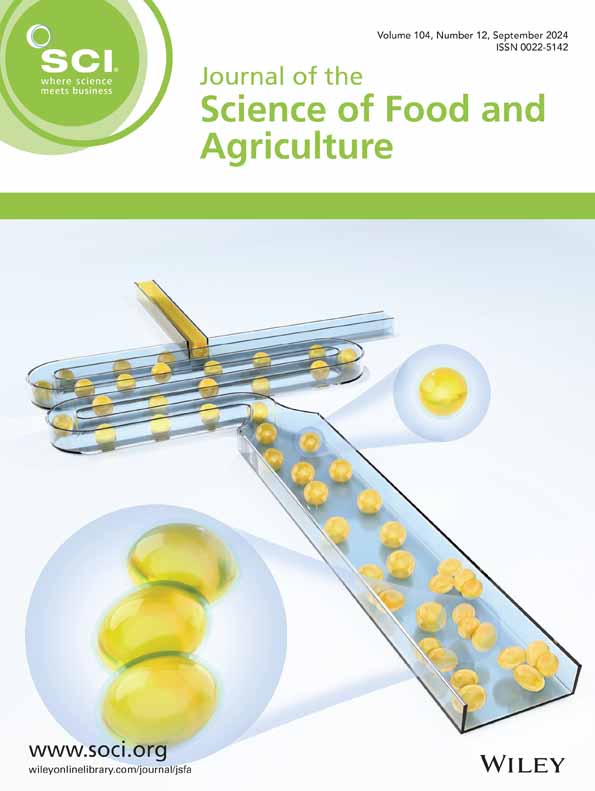Anuj Ranjan, Vishnu D Rajput, Sudhir Shende, Pallavi Saxena, Evgeniya V Prazdnova, Svetlana Sushkova, Jayati Arora, Abhishek Chauhan, Tanu Jindal, Sajad Majeed Zargar, Tatiana Minkina
求助PDF
{"title":"环保制造的锌基纳米颗粒:在农业进步和阐明毒性方面的影响。","authors":"Anuj Ranjan, Vishnu D Rajput, Sudhir Shende, Pallavi Saxena, Evgeniya V Prazdnova, Svetlana Sushkova, Jayati Arora, Abhishek Chauhan, Tanu Jindal, Sajad Majeed Zargar, Tatiana Minkina","doi":"10.1002/jsfa.14243","DOIUrl":null,"url":null,"abstract":"<p><p>Zinc (Zn) is a vital micronutrient required for optimal plant growth and soil fertility. Its use in the form of nanoparticles (NPs) has gained significant attention in agricultural applications. Green synthesized Zn-based NPs offer an eco-friendly solution to several conventional problems in agriculture. Several plants, bacteria, fungi and yeast have shown significant potential in fabricating Zn NPs that can provide environmentally friendly solutions in agriculture and the approach is aligned with sustainable agricultural practices, reducing the dependency on harmful agrochemicals. Zn-based NPs act as plant growth promoters, enhance crop yield, promote resilience to abiotic stressors and are efficient crop protection agents. Their role as a smart delivery system, enabling targeted and controlled release of agrochemicals, further signifies their potential use in agriculture. Because agriculture requires repeated applications hence, the toxicological aspects of Zn NPs cannot be ignored. Zn NPs are reported to cause phytotoxicity, including root damage, physiological and biochemical disturbances, and genotoxic effects. Furthermore, exposure to Zn NPs poses risks to soil microbiota, and aquatic and terrestrial organisms potentially impacting the ecosystem. The green synthesis of Zn-based NPs has a promising aspect for advancing sustainable agriculture by reducing agrochemical use and improving crop productivity. Their diverse applications as plant growth promoters, crop protectants and smart delivery systems emphasize their potential. However, the toxicological aspects are essential to ensure the standardization of doses for their safe and effective use. Further research would help address such concerns and help in developing viable and eco-friendly solutions for modern agriculture. © 2025 Society of Chemical Industry.</p>","PeriodicalId":17725,"journal":{"name":"Journal of the Science of Food and Agriculture","volume":" ","pages":""},"PeriodicalIF":3.3000,"publicationDate":"2025-04-06","publicationTypes":"Journal Article","fieldsOfStudy":null,"isOpenAccess":false,"openAccessPdf":"","citationCount":"0","resultStr":"{\"title\":\"Eco-friendly fabrication of Zn-based nanoparticles: implications in agricultural advancement and elucidation of toxicity aspects.\",\"authors\":\"Anuj Ranjan, Vishnu D Rajput, Sudhir Shende, Pallavi Saxena, Evgeniya V Prazdnova, Svetlana Sushkova, Jayati Arora, Abhishek Chauhan, Tanu Jindal, Sajad Majeed Zargar, Tatiana Minkina\",\"doi\":\"10.1002/jsfa.14243\",\"DOIUrl\":null,\"url\":null,\"abstract\":\"<p><p>Zinc (Zn) is a vital micronutrient required for optimal plant growth and soil fertility. Its use in the form of nanoparticles (NPs) has gained significant attention in agricultural applications. Green synthesized Zn-based NPs offer an eco-friendly solution to several conventional problems in agriculture. Several plants, bacteria, fungi and yeast have shown significant potential in fabricating Zn NPs that can provide environmentally friendly solutions in agriculture and the approach is aligned with sustainable agricultural practices, reducing the dependency on harmful agrochemicals. Zn-based NPs act as plant growth promoters, enhance crop yield, promote resilience to abiotic stressors and are efficient crop protection agents. Their role as a smart delivery system, enabling targeted and controlled release of agrochemicals, further signifies their potential use in agriculture. Because agriculture requires repeated applications hence, the toxicological aspects of Zn NPs cannot be ignored. Zn NPs are reported to cause phytotoxicity, including root damage, physiological and biochemical disturbances, and genotoxic effects. Furthermore, exposure to Zn NPs poses risks to soil microbiota, and aquatic and terrestrial organisms potentially impacting the ecosystem. The green synthesis of Zn-based NPs has a promising aspect for advancing sustainable agriculture by reducing agrochemical use and improving crop productivity. Their diverse applications as plant growth promoters, crop protectants and smart delivery systems emphasize their potential. However, the toxicological aspects are essential to ensure the standardization of doses for their safe and effective use. Further research would help address such concerns and help in developing viable and eco-friendly solutions for modern agriculture. © 2025 Society of Chemical Industry.</p>\",\"PeriodicalId\":17725,\"journal\":{\"name\":\"Journal of the Science of Food and Agriculture\",\"volume\":\" \",\"pages\":\"\"},\"PeriodicalIF\":3.3000,\"publicationDate\":\"2025-04-06\",\"publicationTypes\":\"Journal Article\",\"fieldsOfStudy\":null,\"isOpenAccess\":false,\"openAccessPdf\":\"\",\"citationCount\":\"0\",\"resultStr\":null,\"platform\":\"Semanticscholar\",\"paperid\":null,\"PeriodicalName\":\"Journal of the Science of Food and Agriculture\",\"FirstCategoryId\":\"97\",\"ListUrlMain\":\"https://doi.org/10.1002/jsfa.14243\",\"RegionNum\":2,\"RegionCategory\":\"农林科学\",\"ArticlePicture\":[],\"TitleCN\":null,\"AbstractTextCN\":null,\"PMCID\":null,\"EPubDate\":\"\",\"PubModel\":\"\",\"JCR\":\"Q1\",\"JCRName\":\"AGRICULTURE, MULTIDISCIPLINARY\",\"Score\":null,\"Total\":0}","platform":"Semanticscholar","paperid":null,"PeriodicalName":"Journal of the Science of Food and Agriculture","FirstCategoryId":"97","ListUrlMain":"https://doi.org/10.1002/jsfa.14243","RegionNum":2,"RegionCategory":"农林科学","ArticlePicture":[],"TitleCN":null,"AbstractTextCN":null,"PMCID":null,"EPubDate":"","PubModel":"","JCR":"Q1","JCRName":"AGRICULTURE, MULTIDISCIPLINARY","Score":null,"Total":0}
引用次数: 0
引用
批量引用

 求助内容:
求助内容: 应助结果提醒方式:
应助结果提醒方式:


